“The dream is the small hidden door in the deepest and most intimate sanctum of the soul, which opens to that primeval cosmic night that was soul long before there was conscious ego and will be soul far beyond what a conscious ego could ever reach.”
― Carl Jung
“What is admirable about the fantastic is that there is no longer anything fantastic: there is only the real.”
― André Breton
And so the fire walked with him. The city of angels still burning, David Lynch has left us far too soon: the utterly wholesome and utterly strange wayfarer of dreams, cinema’s unconscious, and the beauty that flares on dark waves of entropy. A man with one foot in the unified field and another firmly planted on the earth of good cups of coffee, cola, and damn fine cherry pie — where revelations are jotted down on diner napkins. And ideas are always met as miraculous, otherworldly fish.
Though I have a feeling Lynch will be busy as ever in the astral plane, a world without his earthly embodiment is certainly less luminous. I think we are all just a little more lost without this psychopomp of the 12th house, at a moment when the nightmares he made his muse are rupturing the surface of consensus reality. Speaking of the 12th House, Lynch bringing the teachings of transcendental meditation to the prison system in the USA is such a beautiful manifestation of his 12th House Venus-Neptune (the 12th rules over all places of confinement).
Like so many of us, the news has left me shattered. It still doesn’t feel real. The first time my teenage self saw the closeup pan of the severed ear in the field of Blue Velvet, I was altered. It was the first film to give me the feeling of a dream I’d forgotten I had told back to me —the lacquer wash on an oil painting that makes the darks glitter with new depth and texture.
Just as strange doubles and loops recur through Lynch’s films, I was struck by the mirroring of Bowie’s untimely death in 2016. Another Capricorn named David who also passed just days before his solar return. And right before a Trump inauguration, when the nodes of the Moon were also positioned in Pisces and Virgo. Just as Bowie’s death felt like an omen, I have the same feeling about Lynch.
In my last post I wrote about a recurring vision over New Year’s of celluloid burning, clawing itself open into wormholes of pure incandescence. Somehow, it feels right that Lynch would leave this earthly plane in the city he loved — a restless muse of winding roads, abandoned theatres, and empty hotel rooms — which also represented, in his words, “freedom and light”. His own sprawling, living text on fire — Lynchian, yes — and also a last reminder that there’s no going back home. Especially in this epoch of collapse. But there’s always a door to another room.
A source close to Lynch revealed that he was meditating while he died — something that brings me deep comfort. He also passed during his lunar return, just days before his birthday. I’ve noticed that people often depart as the luminaries return, their souls leaving the way they entered. Maybe this is especially true for Capricorn, the sign that presided over the Gate of the Gods, according to the ancients, where souls departed and ascended to heaven. Capricorn, as Saturn’s earthbound face, represents our mortality — but is also the sign to release us from these fleshy fetters.
///
Lynch encapsulated the paradoxes of the sea goat, the pragmatic and toilsome earth sign ruling farmers, sculptors, toilers, and insomniacs (perhaps explains the coffee), that also guards the mysteries that await us after death. Lynch often spoke of the regularity of his routines: the same 2:30 lunch at Bob’s diner, the same uniform of a blazer and buttoned up shirt, and his later weather reports uploaded on YouTube, peppered with his Midwestern “by gollies” (something that kept me sane during the pandemic: god bless you, David). “Be regular and orderly in your life,”, said Flaubert, “so you may be violent and original in your work”. It seems that Lynch’s Saturnian discipline laid the foundation for his imagination’s truly radical sea-faring.
Though Capricorn’s more liminal and prophetic qualities have been lost in pop astrology, the ancients believed that prominent Capricorn placements were required in the honing of psychic abilities. Lynch certainly embodied the sea goat’s inbetweeness, one nimble hoof on terra-firma and that fantastical tail dowsing the deep waters of the unconscious. It’s fitting then that Lynch would describe his own creative process as fishing (and there’s something so deeply Page of Cups about Lynch):
“Ideas are like fish. If you want to catch little fish, you can stay in the shallow water. But if you want to catch the big fish, you've got to go deeper. Down deep, the fish are more powerful and more pure.”
Just as astrology is an art scrying qualities of light, so is cinema a symbolic language of radiance and shadow — and Lynch was a master of this. Capricorn’s providence over the void, the emptiness, the darkest depths of winter, provides a paradoxically fertile (and necessary) dialectical space. Or, in David Lynch’s words:
“The more you throw black into a colour, the more dreamy it gets… Black has depth. It's like a little egress; you can go into it, and because it keeps on continuing to be dark, the mind kicks in, and a lot of things that are going on in there become manifest. And you start seeing what you're afraid of. You start seeing what you love, and it becomes like a dream.”
As I explored in a post last Capricorn Season, in Hindu mythology, the Makara, a crocodile-like sea creature, is the equivalent to Capricorn. Considered guardians of gateways and thresholds, they protected the throne rooms of forbidden temples. Like the sea-goat, the Makara is also “two-natured and half-finished”, intermezzo, depicted as a half terrestrial and half aquatic animal. Lynch’s work is strewn with such portals. And demons often ghost their thresholds — crouching behind a flower-patterned sofa in Twin Peaks or lurking behind the dumpster in Mulholland Drive.
Coming of age during the witch hunts of McCarthyism and looming nuclear war, Lynch was also determined to shatter the veneer of post-war America. Another indelible Lynchian image: the red roses against an incandescent white picket fence, the opening shot in Blue Velvet, so lushly oversaturated the blooms verge on the uncanny. Through Lynch’s cinematic vision, they are immaculate emblems of themselves, already marbled-over, dead. “There is goodness in blue skies and flowers, but another force–a wild pain and decay—also accompanies everything,” he said. Lynch is very much a Scorpio rising after all, his chart ruler, Mars, conjunct Saturn, the planet of death and entropy. His Mars is also retrograde in Cancer, just as we’re experiencing now, yet another haunting planetary return as he transitions to the other side.
Mars in Cancer, our fallen warrior roving the temple of the Moon, is a troubling of everything Luna represents: domesticity, the maternal and life-nurturing, memories, nostalgia, and perhaps the Cancerian identity of the United States itself. Lynch said “the house is a place where things can go wrong” and Blue Velvet brings a lethal Martian blade to Eisenhower-era Americana and reveals the ants teeming under the surface of its well-watered lawns. Or the animatronics stuffed in its song birds. But the weirdest thing about David Lynch is that he unironically loves the lurching, robotic robin too. Roses, California light, and nightmares: they are all god’s creatures.
With Mars rx in Cancer, there’s a troubling of feminine archetypes as well: the madonna, the whore, the damsel in distress, the girl next door — just as they’re established, these tropes warp and contort in Lynch’s cosmology. The boundaries between them blur. Another Lynchian image seared on my soul: Blue Velvet’s Dorthy Vallens, beaten up and naked, stumbling across those immaculate lawns in the dark. A jump scare that communicates an entire submerged world of domestic violence behind closed doors. But it also represents, at least for me, the wild alterity of the feminine. Something I believe Lynch was committed to capturing.
Mars in Cancer’s ultimate lesson is centered around the limits of protecting the vulnerable, damsel or otherwise. Vallen’s ritual debasement at the hands of Frank is later revealed to the film’s student protagonist, Jeff, who recoils with disgust even as he’s aroused. The sublime Isabella Rosselini, daughter of Ingrid Bergman who symbolized the golden age of Hollywood, bares the mystery of her sadomasochism with a cool equanimity — not the shame we’ve been conditioned to expect. An earlier lounge performance of the titular song, with Rosellini in glamorous femme-fatal mode, is also performed with an odd detachment. The Moon reflects the light of cosmos’ solar authority without complaint, waxing and waning through its rolodex of maiden, mother, and crone. It will not be possessed. The Moon is all flux: rhythmic time-keeper of growth/decay cycles on our earth. Moonlight itself is cold, abstract. It doesn’t warm the flesh. But it creates such shadows.
Lynch’s female leads, even when they’re victimized, seem to maintain a metaphysical agency. They will not be fixed in any frame. They shape shift the moment they’re “saved” (and what are chivalrous rescue missions but another submerged desire to possess). It’s Mars himself that’s fallen, bleeding out and altogether bewildered in the temple of the Moon, chasing watery shadows on its grotto walls.
Like Dorothy Vallen’s desire for pain, the mystery of Laura Palmer’s lonely self-destruction is not answered by Lynch’s cinematic images. But we feel it in the swells of Angelo Badalamenti’s piano motif, a haunting and tonally complex piece of music that functions as a portal itself. Lynch and Badalamenti later made the discovery that the midi notation of the motif, channeled in an intense 20 minute session before the show was even filmed, actually visually resembles the titular Twin Peaks. “It’s cosmic, cosmic, cosmic,” Lynch was quoted as saying after the revelation. This is some Moon-MC shit of the highest order, as well as the magical collaborative synergy of Lynch’s Libran Venus and Neptune in the 12th house. (Below is a glimpse into just how intimately involved Lynch was in his film’s sonic world-building).
When Lynch wondered, again unironically, if he was connected to the Moon — his chart absolutely bears out his theory. It’s that Virgo Moon, conjunct his MC, that speaks to Lynch’s highest offering to the world: a coherent though symbolic dream language that is more felt than understood. Zigzag floors, empty hotel rooms, flickering lights, red velvet curtains, snaking abandoned roads, the eerie, chthonic twang of the Twin Peaks theme emerging from the underworld. The rhythmic, indeed lunar, recurring elements of his surrealism, and the strange intersections of his quantumly entangled characters, nevertheless always feel Virgo precise. Coherent. The puzzle in the other room, as Lynch describes it, was painstakingly pieced together across a lifetime of Virgoan devotion to the mysteries.
The Moon itself is perhaps the ultimate dream portal. Before birth, the soul descended through the planetary spheres from the realm of the fixed stars, picking up different qualities from each of the planets along the way. And then the last celestial gate you pass through before birth is that of the Moon, the first planet in the Chaldean order. The Moon remembers the unified field, while being intricately interwoven in earthly processes. Lynch’s Moon-MC is part of the reason his deep cinematic images feel more remembered than revealed.
And just as moonlight infiltrates our most intimate and hidden spaces, when most of us are sleeping, Lynch brought the luminosity of his imagination to unfathomably painful realities. He was a patron saint of both the robin and the dead insect in its beak; the sickle moon as well as the void she holds in her own white arms.
Finally, this Tweet, by David Ehrlich, really captures what I’ve been trying to say about this strange and wonderful man and his enigmatic Moon-MC.
“David Lynch gave us the language we needed to better articulate the indescribable strangeness of our shared reality. “Lynchian” is so overused because it’s a viscerally understandable word without any known synonyms. I can’t imagine a more beautiful artistic legacy than that”.
I love you, David. I hope wherever you are there’s beautiful blue skies, a few wispy clouds, and golden sunshine coming — always.

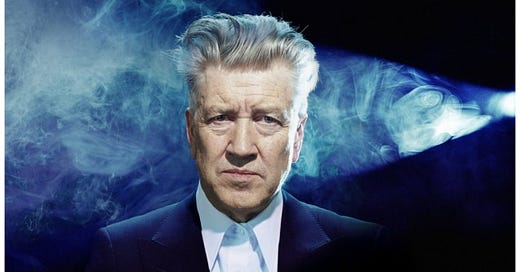




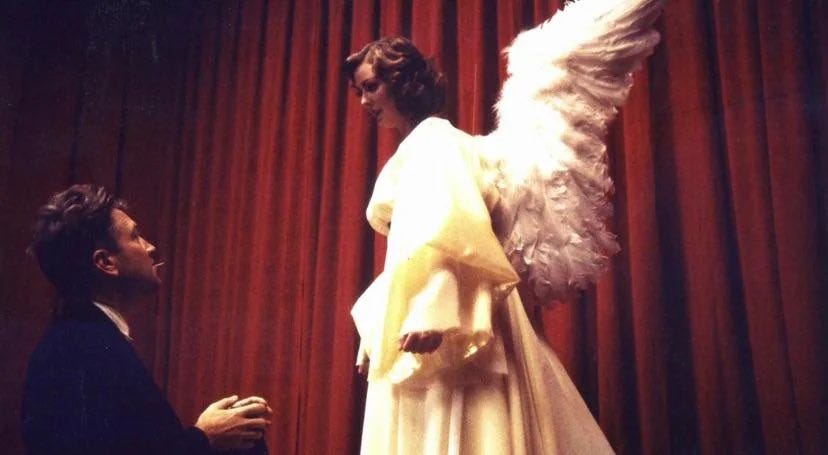
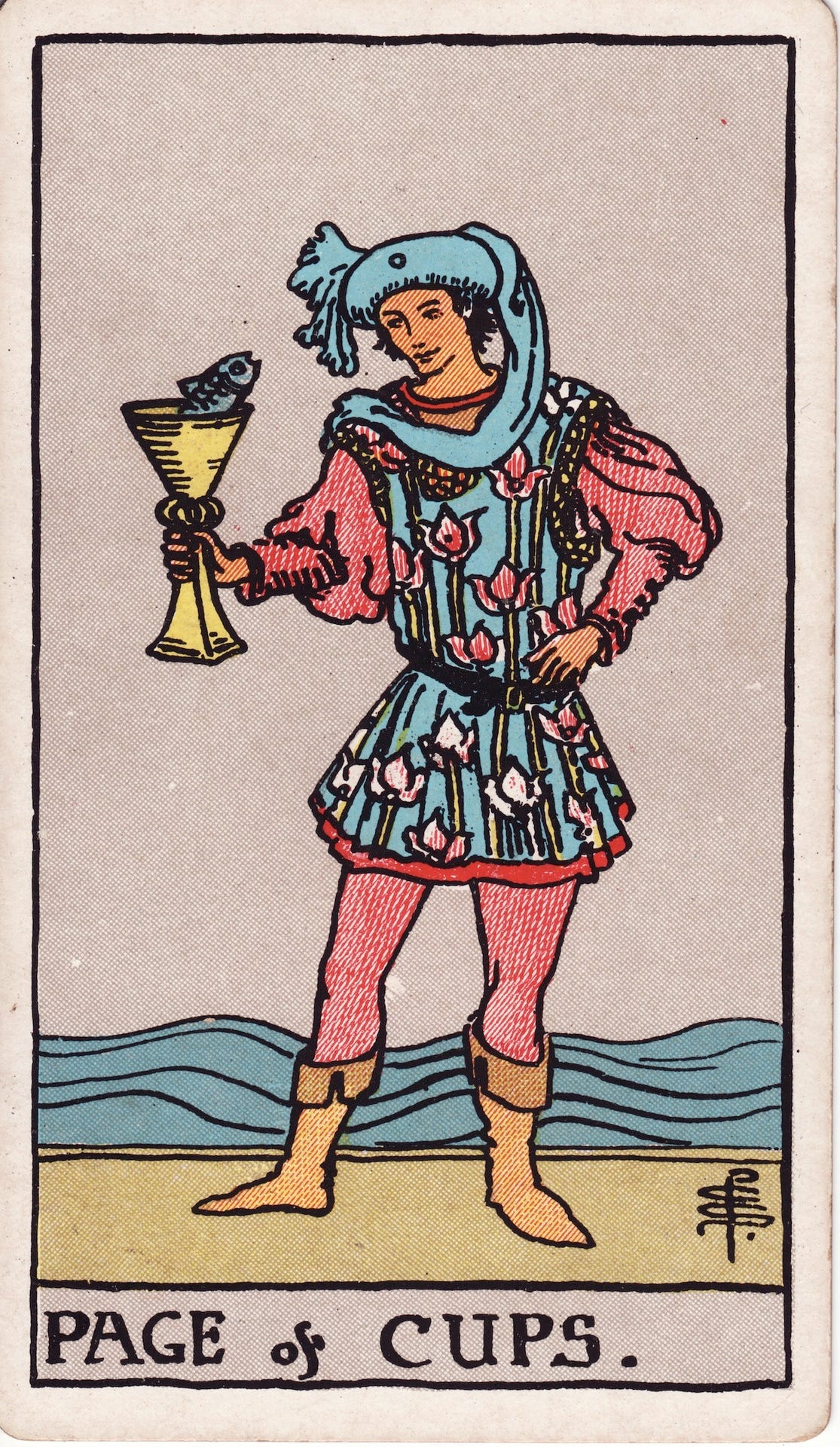

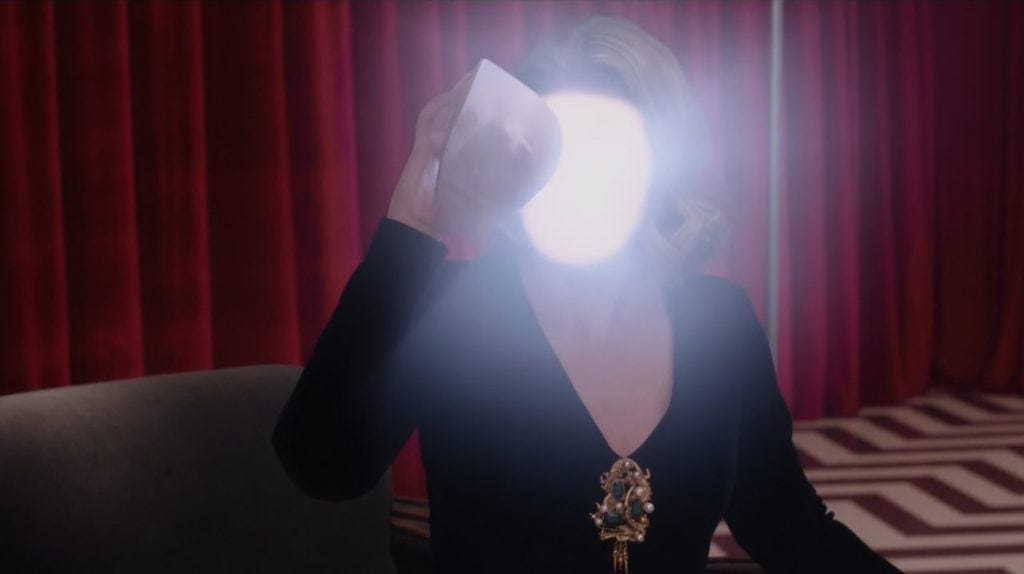
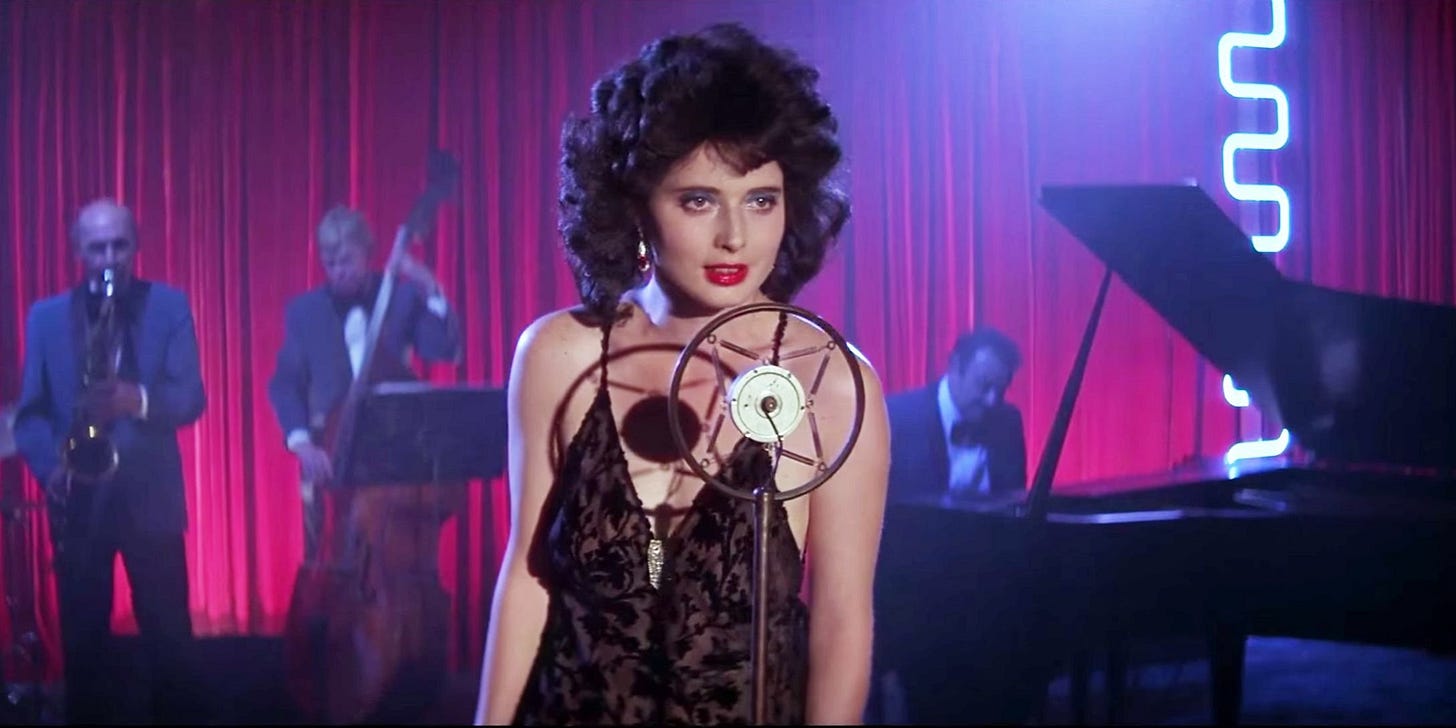
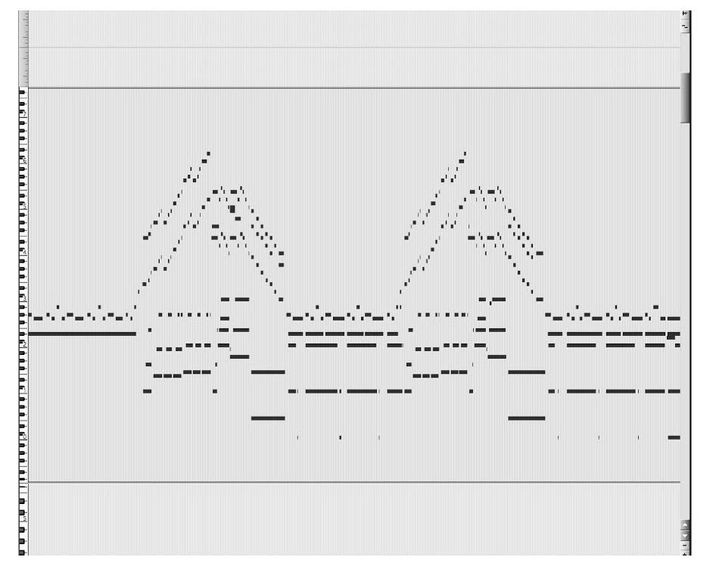
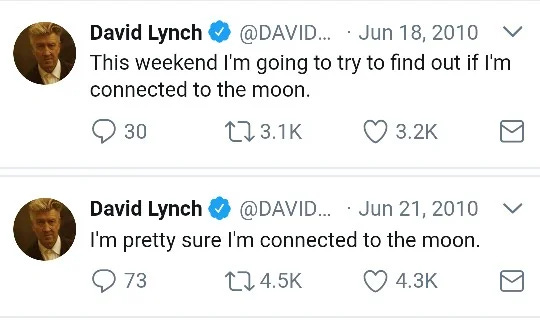
What a gorgeous post. Thank you!
Well written. 👍 He inspires. I know so very little of the man and now discover much more known. Found that I wazam all ready, tuned in for reception. Constantly trying not and going a side ways, that just 1 wood. 4 2 day, now, not 2sorrow. B art. Y?